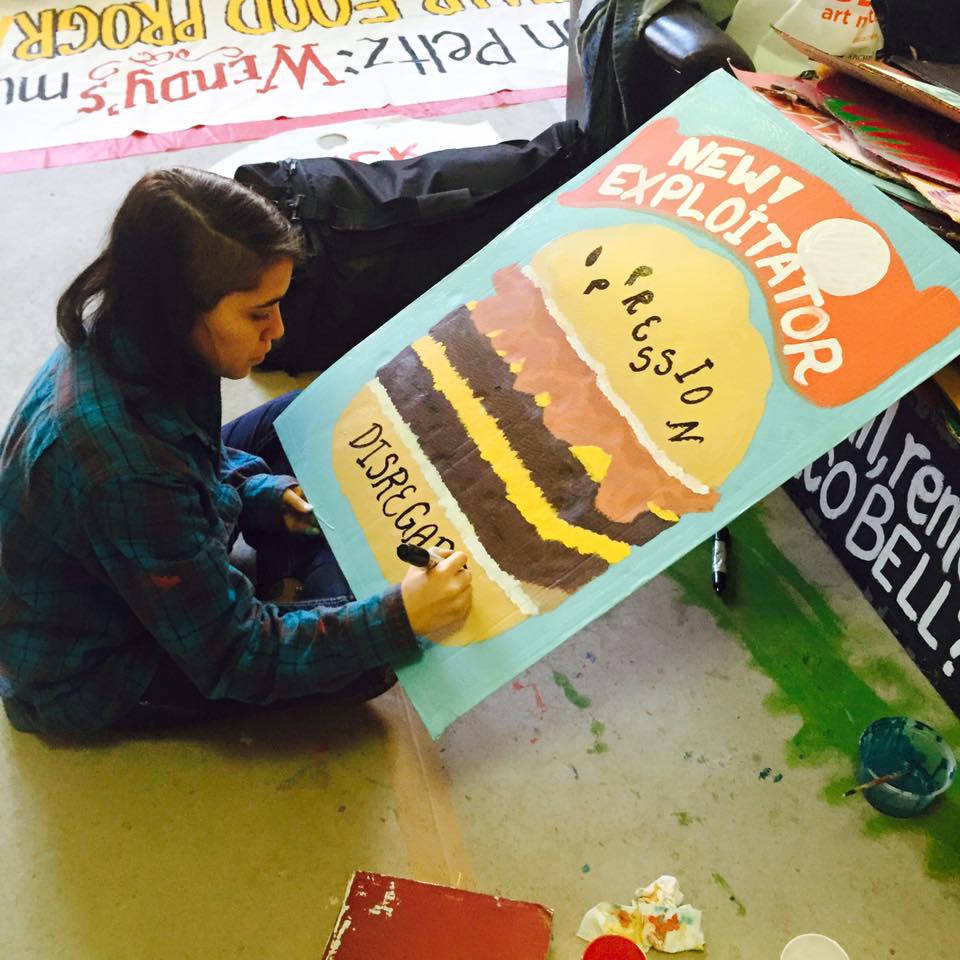Finding a Home on the Hilltop Through Farmworker Justice
Posted in Student Leaders | Tagged CIW, Coalition of Immokalee Workers, DC Fair Food, Fair Food Program, Georgetown University, Pam Escalante, Pamela Escalante, SFA, Social Justice, Student Farmworker Alliance
Pamela Escalante (SFS ’17) reflects on her experience organizing with the Student Farmworker Alliance and the Coalition of Immokalee Workers to eliminate sweatshop conditions in the fields and build a food system based on justice and dignity for farmworkers.
For anyone who, like me almost exactly a year ago, is skeptical of finding a home within Georgetown University, I have good news: there is a 94% chance that it can happen (I say 94% because about 6% of Georgetown students transfer out of Georgetown every year, but the odds are in your favor!).
I transferred to Georgetown as a sophomore in 2014, having no idea what “home” would look like for me within the bubble, but not feeling like I had found it until about seven months after matriculating. My feet finally found the doormat that read “welcome” when I returned from my first action ever. It was the 2015 Spring Action for the Coalition of Immokalee Workers—an organization that, as I have learned, has a big name in the world of organizing and for good reason. I boarded the bus and three days, twenty-five different chants, a serious tan, five new friendships, a crush, and one radicalization later, I had found a piece of authenticity in me that before that trip had never been localized. Authenticity: this is what organizing and the CIW and Student Farmworker Alliance are all about for me; this is the reason I applied to the 2015 SFA Encuentro—which Clara Mejia wrote on earlier this year—and subsequently the SFA Steering Committee.
Before joining the Steering Committee, I had no idea what the work—lifestyle really—of organizing required. The 72-hour Face 2 Face changed this. But, I am getting ahead of myself. The SFA Steering Committee is the on-the-ground organizing team of (mostly) college students from all over the U.S.A. that works with the CIW to organize the Spring Action: this year it will be the Workers Voice Tour! Our team of fourteen people represents a diversity of genders, sexualities (fluid and binary), races, and socioeconomic backgrounds. Our job is to mobilize our home cities, working with local food and worker justice networks to support the CIW’s mission to achieve justice in the produce fields of Florida and the southeast of the United States. Since our membership is scattered from coast to coast, we only meet physically four times a year: the Face 2 Face, the Spring Action, the mid-year retreat, and the Encuentro. Part of the job on Steering Committee is that we are responsible for organizing all of these events: the Face 2 Face and mid-year are only for Steering Committee members, but the Spring Action and Encuentro require the mobilization and organizing of our communities to turn out for public events.
I attended the Face 2 Face in January, just a few weeks ago, and that’s what this blog post is going to detail (yay!). To describe the weekend in two words, I will say this: no chill. I want to qualify it, however, as the best kind of no chill. It’s like that class where you find yourself constantly engaged: decolonizing, deconstructing, and connecting to the coolest people ever, snapping so fervently to all the feels that your thumbs may go numb— but it’s 72 hours long. The action starts on Friday night with dinner and acuerdos, our group agreements. This year, I had the honor of facilitating this tradition. We fill out a large white sheet of paper with the goals and expectations of the Steering Committee, not just for the weekend but also for the rest of our term (one lunar calendar year). Some of the acuerdos include “one mic,” “foster a safe space,” “call-in not call-out,” and “no technology when we are in session.” After building the acuerdos we split off into dinner, enjoying an authentic meal of Mexican fajitas, beans and rice with tortillas.
The hard work began at 7am the next day (7am would be the wakeup hour for the entire weekend). The Steering Committee is responsible for setting up and cleaning all of the meals and spaces for the weekend. This labor is divided throughout the weekend between groups: familias. These families are the same familias that the Steering Committee uses for checking in throughout the organizing process. Both Friday and Saturday were filled with intense learning. The SFA uses popular education to facilitate the learning throughout the entire weekend—horizontal learning with minimal to no hierarchy. The workshops what we facilitated and participated in ranged from the uses of technology in organizing, Organizing 101, fundraising, how to talk about the campaign, dealing with oppression and micro-aggressions, and facilitating working groups. Although the weekend is no vacation, the space is actually rejuvenating. The workshops are structured using popular education models and Steering Committee members teach other Committee members. This is what makes the Coalition of Immokalee Workers so successful, I think. It generates a self-sustaining movement, and the Steering Committee and Alliance for Fair Food staff foster a creative and passionate learning space that is conducive to high energy. The CIW has worked out a system to protect its volunteers and staff from becoming jaded or frustrated by this challenging work.
Working in social justice is a run through the mountains: absolutely beautiful and exhausting. I wasn’t sure that I would find anything like this at Georgetown, but thanks to organizations and spaces like the Kalmanovitz Initiative, I have been able to not only meet people but maintain relationships with new friends who have inspired me to go beyond the words “I’m into social justice,” to carry that energy and focus beyond Georgetown and into the D.C. community and Immokalee, Florida.

